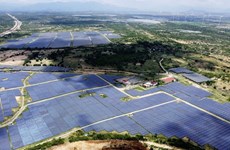VN needs to carry out reforms to escape “middle income trap”
Vietnam will face with the danger of the so-called "middle income trap"
if the country does not take a route of substantial reforms with proper
priorities, warned the Nhan Dan (People) online newspaper.
Vietnam will face with the danger of the so-called "middle income trap"
if the country does not take a route of substantial reforms with proper
priorities, warned the Nhan Dan (People) online newspaper.
Becoming a middle-income country has posed enormous challenges for Vietnam, including the danger of getting caught in the middle income trap. The issue is one of the biggest challenges facing the nation in the process of becoming a “high income” country and reaching still higher goals, said Deputy Prime Minister and Foreign Minister Pham Binh Minh.
He made the statement on March 24 in Hanoi at the “International Conference on Economic Reforms for Inclusive and Sustainable Growth: International Experience and Lessons for Vietnam”, which was co-organised by the Ministry of Foreign Affairs, the UN Development Programme (UNDP) and the Vietnam Academy of Social Sciences.
The conference attracted the participation of many international organisations, experts and lecturers from the US, India, Indonesia, Thailand and elsewhere. At the event, they shared the experience of countries that reached the middle income level but were able to escape from the trap.
Dr. Thangavel Palanivel, chief economist and chief of the Regional Strategy and Policy Unit under the UNDP Regional Bureau for Asia and the Pacific, said that Vietnam can learn from the development model employed by the Republic of Korea (RoK), under which high-quality education and scientific development went together with economic growth and increased job creation on the labour market.
The development experiences of countries around the world have shown that countries with persistent reforms, good institutional frameworks and high competitiveness indices can overcome the middle income trap. However, escaping from the trap is not as simple as blindly following a predetermined model.
According to Professor Robert Lawrence of Harvard University, Vietnam’s joining the Trans-Pacific Partnership Agreement could contribute to enhancing the nation’s competitiveness, but it may also result in many problems. Among these, he said, were unintended consequences that could harm agricultural or industrial production, as the State is not allowed to subsidize domestic production under the agreement. He added that success is not decided beforehand, and that it is easier said than done.
Discussing economic reform towards sustainable development, UNDP Administrator Helen Clark said that Vietnam should focus its efforts on improving the productivity and quality of agricultural production and on developing its high value sectors to gain from its competitive advantages both in the region and worldwide.
She noted that Vietnam engages in a vast quantity of agricultural production; therefore, it is advisable to take advantage of agriculture to increase the added value of farmers. Clark expressed her willingness to share with Vietnam the experience of New Zealand, her homeland - a country whose economic development of the economy was largely based on agriculture. She also pledged the future assistance of the UNDP.
The UNDP Administrator said that, while touring the Central Highlands and the Southeast Region to learn about poverty reduction in Vietnam, she saw many effective models that should be duplicated in other regions. She suggested that Vietnamese authorities seek ideas from such models for the upcoming reform process, one which she called “second generation economic reform.”
According to the Institute of Policy and Strategy for Agriculture and Rural Development (IPSARD), agricultural labour accounts for nearly 50% of the total national labour force and around 70% of the population in rural areas. However, the labour productivity of Vietnam is the lowest in the region.
The UNDP recommends that Vietnam take action to improve labour productivity and the quality of agriculture and aquaculture as part of its development strategy, as nearly all the nation’s poor live and work in rural areas.-VNA
Becoming a middle-income country has posed enormous challenges for Vietnam, including the danger of getting caught in the middle income trap. The issue is one of the biggest challenges facing the nation in the process of becoming a “high income” country and reaching still higher goals, said Deputy Prime Minister and Foreign Minister Pham Binh Minh.
He made the statement on March 24 in Hanoi at the “International Conference on Economic Reforms for Inclusive and Sustainable Growth: International Experience and Lessons for Vietnam”, which was co-organised by the Ministry of Foreign Affairs, the UN Development Programme (UNDP) and the Vietnam Academy of Social Sciences.
The conference attracted the participation of many international organisations, experts and lecturers from the US, India, Indonesia, Thailand and elsewhere. At the event, they shared the experience of countries that reached the middle income level but were able to escape from the trap.
Dr. Thangavel Palanivel, chief economist and chief of the Regional Strategy and Policy Unit under the UNDP Regional Bureau for Asia and the Pacific, said that Vietnam can learn from the development model employed by the Republic of Korea (RoK), under which high-quality education and scientific development went together with economic growth and increased job creation on the labour market.
The development experiences of countries around the world have shown that countries with persistent reforms, good institutional frameworks and high competitiveness indices can overcome the middle income trap. However, escaping from the trap is not as simple as blindly following a predetermined model.
According to Professor Robert Lawrence of Harvard University, Vietnam’s joining the Trans-Pacific Partnership Agreement could contribute to enhancing the nation’s competitiveness, but it may also result in many problems. Among these, he said, were unintended consequences that could harm agricultural or industrial production, as the State is not allowed to subsidize domestic production under the agreement. He added that success is not decided beforehand, and that it is easier said than done.
Discussing economic reform towards sustainable development, UNDP Administrator Helen Clark said that Vietnam should focus its efforts on improving the productivity and quality of agricultural production and on developing its high value sectors to gain from its competitive advantages both in the region and worldwide.
She noted that Vietnam engages in a vast quantity of agricultural production; therefore, it is advisable to take advantage of agriculture to increase the added value of farmers. Clark expressed her willingness to share with Vietnam the experience of New Zealand, her homeland - a country whose economic development of the economy was largely based on agriculture. She also pledged the future assistance of the UNDP.
The UNDP Administrator said that, while touring the Central Highlands and the Southeast Region to learn about poverty reduction in Vietnam, she saw many effective models that should be duplicated in other regions. She suggested that Vietnamese authorities seek ideas from such models for the upcoming reform process, one which she called “second generation economic reform.”
According to the Institute of Policy and Strategy for Agriculture and Rural Development (IPSARD), agricultural labour accounts for nearly 50% of the total national labour force and around 70% of the population in rural areas. However, the labour productivity of Vietnam is the lowest in the region.
The UNDP recommends that Vietnam take action to improve labour productivity and the quality of agriculture and aquaculture as part of its development strategy, as nearly all the nation’s poor live and work in rural areas.-VNA













